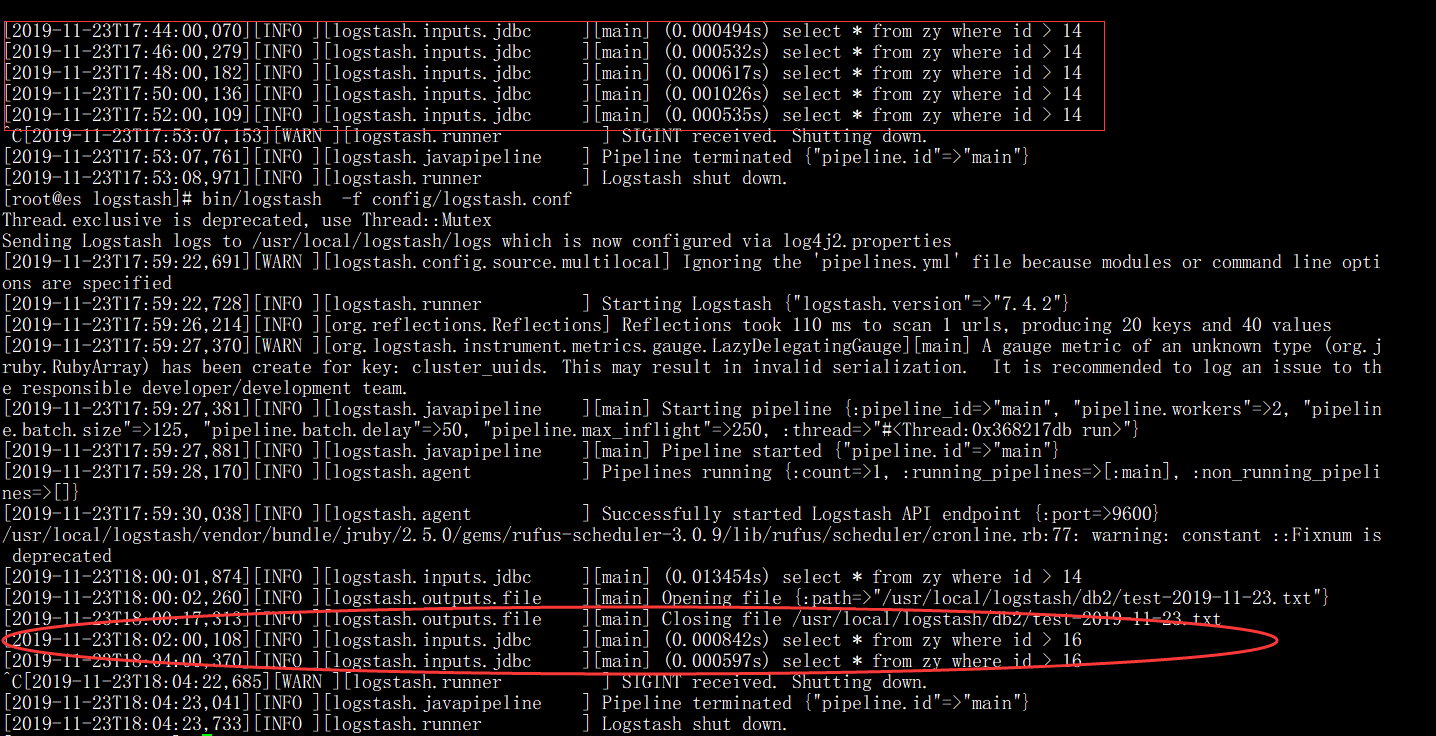Recently, there is a need to synchronize the data in a table in mysql to es. After analysis, use the jdbc plug-in of logstash or get the data in mysql. output to es. There are two collection situations: first, full collection, then incremental collection.
Process verified as follows:
1. Install longstash and mysql
The installation of mysql and logstash can be found on the Internet.
Note:
1) may need to be installed: bin / plugin install logstash input JDBC
2) MySQL driver download https://cdn.mysql.com/downloads/connector-j/mysql-connector-java-5.1.48.tar.gz
2. Create mysql tables and data
create table test.zy (
id int,
str varchar(20)
) ;
insert into test.zy values('1','a1');
insert into test.zy values('2','a2');
insert into test.zy values('3','a3');
insert into test.zy values('4','a4');
insert into test.zy values('5','a5');
insert into test.zy values('6','a6');
insert into test.zy values('7','a7');
insert into test.zy values('8','a8');
insert into test.zy values('9','a9');
insert into test.zy values('10','a10');
insert into test.zy values('11','a11');
insert into test.zy values('12','a12');
insert into test.zy values('13','a13');
insert into test.zy values('14','a14');
#Incremental collection verification of inserted data
insert into test.zy values('15','a15');
insert into test.zy values('16','a16');3.logstash collects mysql configuration files
#Incremental collection by field
input {
jdbc {
jdbc_connection_string => "jdbc:mysql://ip:3306/test"
jdbc_user => "root"
jdbc_password => "123456"
jdbc_driver_library => "mysql-connector-java-5.1.36-bin.jar"
jdbc_driver_class => "com.mysql.jdbc.Driver"
statement => "select * from zy where id > :sql_last_value"
use_column_value => true
tracking_column => "id"
record_last_run => true
last_run_metadata_path => "/root/test.log"
schedule => "*/2 * * * *"
}
}
output {
file {
path => "./mysql/test-%{+YYYY-MM-dd}.txt"
}
}
#Collect based on time stamp increment
input {
jdbc {
jdbc_connection_string => "jdbc:mysql://ip:port/test"
jdbc_user => "root"
jdbc_password => "123456"
jdbc_driver_library => "mysql-connector-java-5.1.36-bin.jar"
jdbc_driver_class => "com.mysql.jdbc.Driver"
jdbc_default_timezone =>"Asia/Shanghai" #Set the time zone of the SQL last value record, otherwise it will affect the effect of incremental collection
statement => "select * from zy1 where time > :sql_last_value"
use_column_value => false
record_last_run => true
last_run_metadata_path => "/root/test.log"
schedule => "*/2 * * * *"
}
}
output {
file {
path => "./db2/test-%{+YYYY-MM-dd}.txt"
}
}
input Configuration resolution for
statement implement myqsl Can also be statementpath Heel sql Path to file
use_column_value
//Whether to use the column value as the basis to record the last running position.
//If set to true, the column defined by tracking column is used as: SQL last value
//If it is set to false, then: sql_last_value reflects the last SQL run time.
tracking_column Field name by which incremental collection is based If use_colomn_value by false Can not write
record_last_run Whether to record the location of the collected data
last_run_metadata_path Set up a file to record the location of collected data
schedule sql Frequency of script execution4. Acquisition verification
Start logstash
cd /usr/local/logstash
bin/logstash -f conf/logtash.conf
logstash collection output log:

Output file content view

Record of SQL last value
